Censorship, CIA Sponsored Terror, Civil Liberties, Criminalizing Dissent, Crony Capitalism, FBI Intrusion, Gaza, Human Rights, NSA Spying, Political Prisoner, Prosecution of the Bush Administration, Surveillance, Targeting Muslims, Truth to Power
Podcast: Play in new window | Download
Updates:
—-
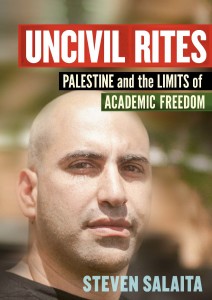
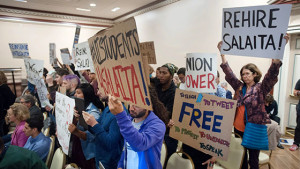
Steven Salaita Hired by American University of Beirut
In what we can view as a major victory for supporters of Palestinian human rights fired Professor Steven Salaita has been hired at the American University in Beirut in the American Studies Department. The American Association of University Professors calls Steven Salaita’s firing one of the significant violations of academic freedom in this decade. Nationwide over 5000 academics pledged to boycott the university resulting in the cancellation of dozens of scheduled talks and conferences at the University of Illinois. The University of Illinois’ action was part of a broader campus crackdown on Palestinian human rights activism that threatens both the foundational role of the university as a place of critical thinking and debate and the ability to advocate for Palestinian rights.
Guest – Professor Steven Salaita, former associate professor of English at Virginia Tech. He is the author of six books and writes frequently about Arab Americans, Palestine, Indigenous Peoples, and decolonization. His current book project is entitled Images of Arabs and Muslims in the Age of Obama.Steven grew up in Bluefield, Virginia, to a mother from Nicaragua (by way of Palestine) and a father from Madaba, Jordan. Books by Salaita, his upcoming book is titled Uncivil Rights and The Limits Of Academic Freedom by Haymarket Press.
—-
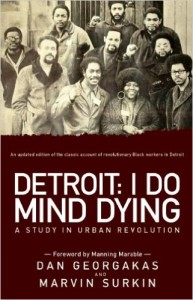
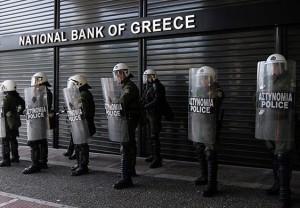
Greece Economic Crisis 2015 Update
Earlier this year we spoke with regular columnist for the National Herald Dan Georgakas about the historic election as the people of Greece voted in the anti-austerity party of Syriza, led by Alexis Tsipiras winning a 149 seats of the 300 seat Parliament. Today, the economic and political state in Greece is in a tremendous state of flux. Will Greece leave the EU and the Eurozone? Will its debt be written down and restructured?
Guest – Dan Georgakas, regular columnist for the National Herald, the leading Greek American weekly newspapero co-author of Detroit: I Do Mind Dying and coeditor of Solidarity Forever: An Oral History of the IWW. He was a frequent contributor to now defunct Journal of the Hellenic Diaspora and the Journal of Modern Hellenism. Dan has taught at NYU, CUNY, Van Arsdale Labor College, Columbia University and University of Oklahoma.
—————————————-
CIA Sponsored Terror, Civil Liberties, Criminalizing Dissent, FBI Intrusion, Guantanamo, Habeas Corpus, Human Rights, Political Prisoner, Prison Industry, Supreme Court, Surveillance, Targeting Muslims
Coming Up Next Week Police Shooting Reaches Supreme Court Exclusive Michael Avery Interview
Podcast: Play in new window | Download
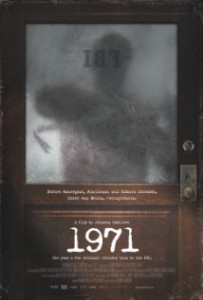

1971
On March 8th 1971, a group of anonymous individuals calling themselves the Citizen’s Commission to Investigate the FBI, broke into an FBI field office in Media, Pennsylvania. They stole thousands of government documents. Among the documents was proof that the FBI under J. Edgar Hoover, was spying on law abiding citizens. The program is known as COINTELPRO and it was used to monitor, manipulate and disrupt social and political movements in the United States. The Citizens’ Commission to Investigate the FBI has been documented recently in a highly acclaimed film titled 1971, directed by Johanna Hamilton.
Johanna Hamilton:
- I consider myself to have the good fortune to have known Betty Medsger, the author of the Burglary, for many years.
- She and I had a personal relationship that long predated our professional collaboration.
- Over time she came to share the outlines of the story with me and it sounded completely remarkable.
- She introduced me to a few members of the Citizens Commission to Investigate the FBI. The 40th anniversary was approaching.
- They wanted the story, which was so little known, to have a larger life.
- To be clear, Betty worked many years on the book. She’s done remarkable and profound research and I joined much later and was the net beneficiary of so much of her research.
- There were four years where we worked in tandem.
- When I showed the film to the Citizens Commission, while the credits rolled, Keith (Keith Forsyth – the lock picker) especially, he got up and said, good job.
- It’s a period of history I’ve been fascinated with since I was a teenager. It was the story of these extraordinary ordinary individuals who had put everything on the line and taken such great personal risk to benefit democracy.
- They trained themselves for one night of crime. They steal all the documents in the office, leak them to the press. They send them to major newspapers, and to a couple politicians. In the end, the Washington Post is the only newspaper that decides to publish the first stories.
- Those first stories reveal with out question illegal government spying on citizens who are going about their daily lives and exercising their First Amendment rights.
- Betty wrote the first stories in the Washington Post and the story fades a little from the headlines. The Pentagon Papers explode 3 or 4 months later. Daniel Ellsberg is on the scene.
- Then our story picks up again.
- It seems inconceivable now but Hoover had been director for over 50 years, and that’s no longer possible.
- Some people who seen the film before say they were really moved by the Church Committee hearings.
- Attorney David Kairys is a huge figure in Philadelphia and yes back in the day he was contacted by two members of the Citizens Commission. He didn’t know what they had done, but if they got caught, they could call him day or night.
- We were reaching the tail end, or we thought we were reaching the tail end of the film when the Snowden revelations happened.
- The Snowden revelations were one thing, absolute bombshell, but prior to that we had a couple of other instances. Back in 2011, September, there were raids all across the country, animal rights activists, environmental groups. One night Brian Williams introduced the news and described these raids and said you know its reminiscent of Hoover back in the 1970s.
- We had whole scenes cut together with that footage and debated and deliberated on that. In the end erred on the side of excluding it.
- It’s opening here in New York City and will start rolling out across the country. If you check our website we update the cities that it will show at. It will be on PBS, Independent Lens at the end of May. 1971Film.com
Guest – Johanna Hamilton, director of the film 1971. She also co-produced Pray the Devil Back to Hell, which won Best Documentary at the Tribeca Film Festival in 2008 and was shortlisted for an Academy Award. Johanna has produced nonfiction programs for PBS, The History Channel, National Geographic, A&E, Discovery Channel, and The Washington Post/Newsweek Productions, including September’s Children, a documentary for PBS exploring how children around the world are affected by terrorism and war.
—–
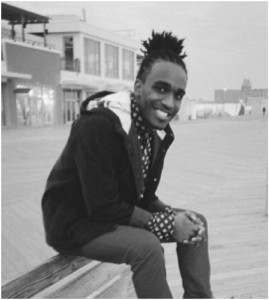
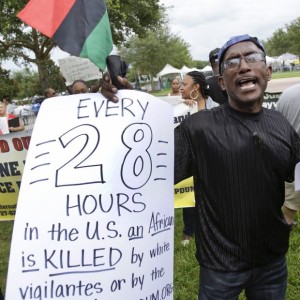
Inspiring, and Awakening Political Activism in Youth
Young people across the nation have played a critical role in taking to the streets to protest social inequities, from Ferguson, Missouri to New York City. In a recent article in the journal Socialism and Democracy, “The Roots of Mass Incarceration: Locking Up Black Dissidents and Punishing the Poor,” writer, activist and youth pastor Nyle Fort describes how he became politically active and who inspired him. We talk with Nyle about the status of protest in this country, the forces of oppression, how young people are involved and how he helps inspire them.
Nyle Fort:
- I graduated from Morehouse College and ended up going to seminary. I was already a licensed and ordained preacher but I wasn’t politicized yet.
- I had already been involved in the community via the church doing speaking engagements with youth and things like that.
- It wasn’t until I got into Princeton Theological Seminary that I began to get politicized.
- The way that it happened was I was taking an introductory seminary class called Systematic Theology with a professor Mark Taylor. In that class he actually had Mumia Abu-Jamal call in live from death row.
- When I heard him speak, I stopped in my seat. This man who I knew nothing of was speaking to me that was moving, not only me but I could tell the entire classroom and doing so by a 6 foot, by 10 foot cell. A cell that he had been in for 30 years, longer than I had been alive.
- Two weeks later I found myself through Mark Taylor at my first rally December 9, 2011. Two days after Mumia had been released from death row.
- I read the New Jim Crow very quickly, then Angela Davis’ works. That was really the beginning for me.
- I entered activism through a prison abolitionist lens, through Mumia.
- The rally for me was an embodiment of the things Mumia was talking about.
- I preach. I was at First Baptist Church in Lincoln Gardens. It’s one of the largest black churches in New Jersey. My style of ministry was evolving as I was being radicalized and politicized.
- I tried to do a lot of social justice work. We were writing letters to our incarcerated brothers and sisters as forms of religious activism.
- I discovered a prophetic religious tradition that comes from a black liberation theological perspective.
- When I was on the bus ride back from Ferguson I was really mad. Mad as hell because I felt there was a relative silence from the church, particularly the black church.
- I believe in love not as a word but as a work.
- When I engage with youth, I try to practice a love that is material. I tell young people, I love you more than they hate you.
- We have to deal the trauma and the pain that we inherit as black people living in the western world and all around the world.
- Love for me is a critical, not a politic that we can talk about, but a practice we can embody and engage in everyday. That has material life.
- We’re going to take Cornell West’s worlds seriously that justice is what love looks like in public, then we have to have a love that’s expansive enough to be material and to be felt.
- Black Lives Matter particularly as a network has articulated a feminist politic, a black feminist politic, a queer politic that is forcing us to live out our intersectionality.
- What we’re not talking about enough is that’s messy, and its not romantic.
- I think of oppression as institutionalized lovelessness. Let’s love each other in ways that causes each other to act.
- Twitter – @nylefort
Guest – Nyle Fort – Nyle is a Master’s of Divinity candidate at Princeton Theological Seminary, a youth pastor, freelance writer, and grassroots community organizer based in Newark, New Jersey. He was very active during the protests in Ferguson, Missouri and New York City.
—————————————————————-

Please help support Law and Disorder by clicking on Fractured Atlas graphic. This radio show is now a sponsored project of Fractured Atlas, a non-profit arts service organization. Contributions for the charitable purposes of Law and Disorder must be made payable to Fractured Atlas only and are tax-deductible to the extent permitted by law. You can donate as little as 5.00 a month.
CIA Sponsored Terror, Civil Liberties, FBI Intrusion, Human Rights, Political Prisoner, Prison Industry, Surveillance, Torture
Podcast: Play in new window | Download


Prison State of America: Chris Hedges, Earl Amin, Amos Caley
Today we hear from 3 extraordinary people that will move you to anger, tears and outrage. Chris Hedges is an award winning journalist and former New York Times Middle East bureau chief . His recent article is Prison State of America outlines in detail how prison workers are gouged by corporate run private prisons. Earl Amin is a former Black Panther who was sentenced to life in prison for conspiracy to commit robbery and served 35 years which is the longest sentence in the state of New Jersey. Amos Caley is with the Interfaith Prison Coalition and a graduate student in the School of Social Work and is with the National Religious Campaign Against Torture, that exposes the abusive practice of solitary confinement in New Jersey prisons
Chris Hedges:
- What we’ve seen in the last few years is a steady assault, economic assault against prisoners and their families.
- Your minimum wage is about $1.30 a day. 8 hours of work, you’re doing prison labor, you work for the state. You’re paid a 1.30.
- They pay you for 5 days a week. That’s about 28 dollars a month.
- Deodorant, stamps, toothpaste, all of this stuff has risen by in many cases over 100 percent.
- Wages in the society at large have remained stagnant and in real terms declined and yet the commissary items have gone through the roof.
- The standard footwear are Reeboks, which cost 45.00. If you don’t have 45.00, they will sell you these sneakers with cardboard soles. The first time you go out in the yard, they’re shredded.
- If you don’t have any money, the prison system has thoughtfully provided a loan system so you can go into debt peonage.
- We have seen private corporations take over the phone system.
- We have seen the removal of other items like thermals. They used to give two blankets, now they give one.
- They’ve also privatized the system where you put money on a prisoners account. Jpay. Again charging draconian fees.
- Remember, we’re talking about very very poor families.
- What we’re seeing now is larger and larger numbers of people within the system who are not only broken, because most families don’t have the resources to send money in those incarcerated, because most of the incarcerated were the primary wage earner, people are going into debt.
- You have a 10 thousand dollar fine imposed on you when you’re sentenced. You’re earning 28 dollars a month, you have no outside resources.
- 25 years later, this is an actual case, you still owe 4 thousand dollars.
- People are finishing prison in debt. The very forces of predatory capitalism that are destroying working men and women outside the walls of prison, are running rampant inside the walls of prison.
- That is a kind of window of what’s going to happen to rest of us.
- Much of the military equipment is produced by federal prisoners – Kevlar jackets, body armor, canteens, etc
Guest – Chris Hedges, Pulitzer-Prize winning author and journalist. He was also a war correspondent, specializing in American and Middle Eastern politics and societies. His most recent book is ‘Death of the Liberal Class (2010). Hedges is also known as the best-selling author of War is a Force That Gives Us Meaning (2002), which was a finalist for the National Book Critics Circle Award for Nonfiction.
—–
Earl Amin:
- In 1967, I was drafted right out of high school into the Army.
- I met this white kid from Boston and he said Earl let’s go into town tonight which is Augusta, they some bad cats out there, I want you to meet them.
- I thought he was talking about Motown, Temptations, I never thought he’d talk about the Black Panthers. I went out there and heard these guys talking about the government.
- Later on I was transferred to Fort Dix, New Jersey – went to Central Park with my sister, Angela Davis was speaking. I had on my Army uniform. She said brother are you in the Army, I said yea. You been to the South? She said you don’t need to be this army you need to be in our army.
- I went AWOL that day. I joined the panthers that day until the FBI caught up with me six months later and charged me with being AWOL and sent me to Fort Leavenworth.
- I stayed there about nine months and they released me, went back to being a panther again, came home.
- Later on I was involved with something called Operation Breadbasket out of Chicago. We was out there feeding the poor people. I was out there when Fred Hampton was killed.
- I got arrested for guns. I went back to prison for a few months and came out.
- Then I got arrested for conspiracy to commit bank robbery, just talking about it. I was given a life sentence.
- I went to New Jersey State prison, Trenton.
- I started doing a lot of para-legal work and helping a lot of other people get out of prison.
- One judge told me if I was sentencing you today, I would give you 3 years.
- I was the first person in the history of the state to be sentenced to life for a robbery charge.
- Being 65, I took a job as a construction worker working 2 days a week, barely enough.
- I was listening to POP, Peoples Organization for Progress, with Larry Ham.
- For years and years I’ve earned a dollar thirty a day.
- That’s one of the problems, I’m comin home. I can’t get social security cause I ain’t paid nothing into social security.
- I can’t get a job because of my age, so what am I supposed to do?
- If you didn’t work, you didn’t get no toothpaste, you didn’t get no coffee.
- I personally, filed my own divorce.
- Rubin Hurricane Carter was my hero. Rubin resisted everything.
Guest – Earl Amin, a former Black Panther who was sentenced to life in prison for conspiracy to commit armed robbery. Earl has been released from prison after 35 years.
—–
Amos Caley – Interfaith Prison Coalition
- We’re realizing that talk is cheap. Looking at people who are most affected, and what they’re doing in terms of mobilizing themselves around this, is really a key to creating a sustained grassroots effort against the (predatory capitalist) system.
- We really have to organize around the demands of the families and the victims.
- That’s what the Interfaith Prison Coalition is about.
- One of things we’re doing is mounting a campaign to make it so that prisoners are paid minimum wage.
- We’re talking about a minimum wage for service workers on the outside, which will have a huge impact.
Guest – Amos Caley, a graduate student in the School of Social Work and is with the National Religious Campaign Against Torture, that exposes the abusive practice of solitary confinement in New Jersey prisons.
————————————————————

Please help support Law and Disorder by clicking on Fractured Atlas graphic (link is fixed). This radio show is now a sponsored project of Fractured Atlas, a non-profit arts service organization. Contributions for the charitable purposes of Law and Disorder must be made payable to Fractured Atlas only and are tax-deductible to the extent permitted by law. You can donate as little as 5.00 a month.
CIA Sponsored Terror, Civil Liberties, Criminalizing Dissent, FBI Intrusion, Habeas Corpus, Human Rights, Political Prisoner, Prison Industry, Surveillance, Targeting Muslims, Truth to Power
Podcast: Play in new window | Download
Updates:
- Hosts Discuss Mass Demonstrations In Wake Of Ferguson Grand Jury Verdict
—-
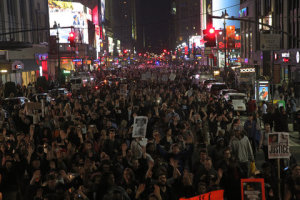

Mumia Abu Jamal Responds To Grand Jury Not Indicting Ferguson Police Officer Darren Wilson
We talk today about the wide scale pattern of police violence against people of color in the context of the grand jury decision in St. Louis, Missouri to not indict Ferguson police officer Darren Wilson for the fatal shooting of Michael Brown, an unarmed 18 year old African American. The decision sparked more outrage within the community of Ferguson and launched tens of thousands into the streets in cities across the country. The grand jury is comprised of 12 members and 10 out of the 12 would have to agree to indict. The grand jury had a number of choices, such as first degree murder, second degree murder, voluntary manslaughter or involuntary manslaughter. First degree murder would have required evidence that Wilson set out to kill Brown. Second degree murder charges were possible, but this choice was unlikely if jurors decided that Wilson was negligent when he shot Brown, they could have gone with a charge of voluntary or involuntary manslaughter.
Mumia Abu Jamal:
- When you think back through American history, there are actually few periods where you see this range of protest.
- You’ll see throughout the 20th century protest. Think about April 4, 1968, the day Martin Luther King Jr. was killed and you saw protests all across the country over hundred cities.
- And look what happened a few hours ago, perhaps a greater range of protest in over 170 cities tells you I think better than anything I can say, that things are very bad indeed for the African American community and their expectation of justice in this system.
- Think about the weather, people coming out in the dire cold, right, to protest at night. That’s not an easy thing, people don’t do that easily and they do it at considerable risk and some danger.
- That speaks to the depth of the feeling in their hearts that something is broken in the American justice system.
- The recent midterm election was the lowest turnout since the 1940s. That says something about American discontent with the political system.
- It actually reminds me about the demonstrations before the 2003 Iraq War, where all around the world in hundreds of countries you saw demonstrations that were unprecedented.
- People feel that. Now that can dissipate until a new provocation.
- This is the time where organizers should be on their p’s and q’s and out there taking phone numbers and taking emails and building lists.
- To stand up at this moment, the first African American president in America’s history and talk about that people need to observe and respect the rule of law is I think frankly absurd.
- Barack Hussein Obama was born August 4, 1961. In that year there were about 20 states that made it illegal for a white person to marry a black person.
- People went to jail for what they called interracial fornication.
- When you talk about the rule of law, you have to talk about the rule of right and the rule of wrong.
- To quote John Africa, who said just cause its legal don’t make it right.
- We live in a country that legalized slavery.
- Many things are done in the name of law, but they’re wrong, they’re simply wrong.
- I was reading in the USA Today last week, (I’m little behind in my reading) they said 461 people were killed by police in 2013.
- This is something that’s systemic in the United States, and the people are trying to draw attention and I don’t think its successful, but its a damn good beginning.
Guest – Mumia Abu-Jamal is a renowned journalist from Philadelphia who has been in prison since 1981 and was on death row since 1983 for allegedly shooting Philadelphia police officer Daniel Faulkner. After decades of appeals, he left death row in 2012 but is still facing a life sentence. He is known as the “Voice of the Voiceless” for his award-winning reporting on police/state violence brutality and other social and racial epidemics that plague communities of color in Philadelphia and throughout the world.
—-

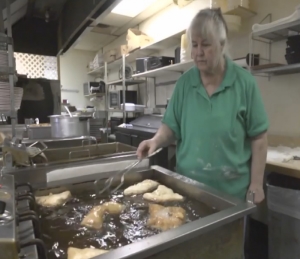
Civil Forfeiture: Federal Government Seizes Property Of Business Owners
In May of 2013, two Internal Revenue Service agents seized the checking account of Carole Hinders and the 32 thousand dollar balance. Hinders was accuses of structuring her deposits to be less than 10 thousand dollars to avoid filing required government reports. This is a tactic often used by drug dealers and other criminals to move money around without detection. However, Carl Hinders owns a Mexican restaurant and her business is cash only. She did explain to the IRS agents that she made deposits almost daily to avoid having thousands of cash on hand. Hinders wasn’t charged with a crime, yet the IRS still seized the money. There are many cases of civil forfeiture similar to Carol’s where the property is taken without proper due process and investigation.
Attorney Larry Salzman:
- Civil forfeiture is a set of laws that allow government agencies to take your property when they suspect its been involved in crime but they don’t need to charge you with any crime to take that property.
- One of the incredible things about civil forfeiture is that the agencies that seize your money based on a mere suspicion actually get to keep that money to fund their agencies.
- That’s true in most states and also for the federal law.
- Every state is engaged in civil forfeiture. Minnesota had a reform. They no longer use strictly civil forfeiture, they’ll only take your property after you’ve been convicted of a criminal offense.
- The federal government uses it (civil forfeiture) almost every major agency of the federal government, the Drug Enforcement Administration, the IRS, the DHS, ICE.
- You can’t have both civil forfeiture and an impartial enforcement of the law if the agencies enforcing that law get the money.
- In federal cases there’s another lack of due process. The federal agencies seize cash like a bank account, the law doesn’t provide any prompt post seizure hearings. So, there’s no right for you to quickly contest the validity of the seizure. You might wait a hear without your money before you get to see a judge.
- It’s very hard to get it back because it means mounting a full scale defense in state or federal court against well funded prosecutors.
- There’s that financial incentive, so the government is doing more and more of these civil forfeitures as their budgets are coming under constraint.
- If local law enforcement involves themselves in a federal forfeiture action, they’ll get paid a bounty by the feds for their participation. That becomes a very meaningful part of police department budgets.
- That equitable sharing program has ballooned from nothing to something over 450 million dollars a year given to local police departments.
- We’re seeing it again with another set of clients. We have 3 brothers who own a convenient store distribution business on Long Island, the IRS again took 446 thousand dollars from them.
- This is a modest business almost all of that money was money that was owed to vendors for inventory. They grabbed their bank account when it was its fullest basically. The allegation again was structuring.
- There’s not even a civil forfeiture action that’s been filed, that’s a violation of law in itself the government’s committed.
- Many of the worst aspects of civil forfeiture were ushered in on the premise that they were needed to combat drug trafficking but now we see civil forfeiture being used to treat legitimate small businesses like criminals, just because they’re making frequent cash deposits.
Guest – Attorney Larry Salzman is with the Institute for Justice. He joined the Institute in April 2011 and litigates cutting-edge constitutional cases protecting individual rights, including free speech, property rights, and economic liberties, in federal and state courts. He is originally from San Diego. His commitment to both entrepreneurship and law is reflected in his career prior to joining IJ. Larry co-founded an ecommerce company with his family in 2000, while attending law school at night, and returned to the business for several years as CEO upon its sale in 2007. During the interim, he was an attorney with Pacific Legal Foundation, in Sacramento, California, litigating property rights cases in federal and state courts, and served as a clerk to Judge Bohdan A. Futey on the United States Court of Federal Claims. Larry received his law degree in 2002 from the University of San Diego, where he was Assistant Editor of the San Diego Law Review. He received an undergraduate degree in Finance from Arizona State University in 1993.
——————————————————————————————————————————–
Afghanistan War, Civil Liberties, Criminalizing Dissent, FBI Intrusion, Gaza, Habeas Corpus, Human Rights, Iraq War, Political Prisoner, Prison Industry, Surveillance, Targeting Muslims, Torture, Truth to Power
Podcast: Play in new window | Download
Updates:
- Michael Ratner: Obama Could Allow “Torture Light” Interpretation of U.N. Treaty on Torture
- Michael Smith Returns From Argentina Book Tour, Describes How U.S Attempts To Destabilize Argentina Economy
——-
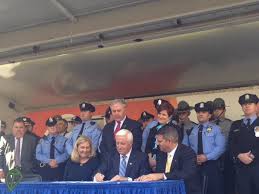
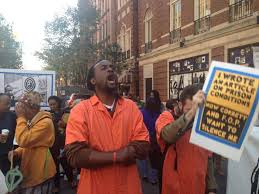
The Revictimization Relief Act (Muzzle Mumia)
Last Thursday, the Pennsylvania State Senate in a bi-partisan 37-11 vote, approved The Revictimization Release Act. This last minute controversial law was ignited by Mumia Abu Jamal’s commencement address delivered at Goddard College in Vermont. The law would grant crime victims or prosecutors acting on their behalf to file a civil action against an offender to seek injunctive relief to stop offenders or former inmates from engaging in conduct that would cause “temporary or permanent state of mental anguish” to the victim.
Mumia Abu Jamal is 60 years old. He’s in the general population at Mahanoy State Correctional Institution in Frackville. He has also given speeches at Evergreen State College in Washington and Antioch College in Ohio.
Attorney Bret Grote:
- The Muzzle Mumia Law as it was called by the Harrisburg Patriot provides a cause of action for a victim of a personal injury crime to sue an offender in state court in Pennsylvania if that offender engages in conduct that “perpetuates” the effect of that crime on the victim. Later on in the statutes, that conduct is defined as including conduct that a temporary or permanent states of mental anguish.
- It also provides for the district attorney where the conviction was secured or the state’s attorney general to essentially act as the private attorney for the victim in order to bring this suit.
- It also does encompass not only speech about the crime whether its somebody like Mumia or Lorenzo Johnson or countless others who speak out about being framed up in Pennsylvania, but it doesn’t even make any exceptions for legal proceedings – and obviously people appealing criminal convictions can cause anguish to others.
- There are standards and no definitions for the conduct that is at issue except in relation to its impact on the victim and to provide some context as I’m sure your listeners know why it was written this way is they needed to write a statute that would sweep so broadly so as to encompass things like Mumia giving a commencement address at Goddard College, which was used as a pretext for whipping up this frenzy at the state legislature.
- It is a prior restraint on the freedom of speech but its written so broadly that Maureen Faulkner or the district attorney could conceivably go into court under this law.
- The House Judiciary committee in discussing this law when it was introduced in committee raised the issue of would this allow a court to enjoin what they called third party vessels.
- It could be Prison Radio, or it could be an individual who is authorized to speak to the media, or make a public statement.
- It was passed 197-0 in the House Legislature, and 37-11 in the Senate.
- It just shows you what takes precedence over any kind of adherence of the Constitution of the state or the United States, more than any law is allegiance to power amongst the political class, Pennsylvania politicians, attorney generals, district attorneys, are no strangers to Constitutional violations, its a normative practice for them.
- Right now, I’m representing Mumia in this and Prison Radio and Robert Holbrook who is a juvenile lifer and Human Rights Coalition member and activist and writer.
- Its unconstitutional under traditional over breadth analysis, it penalized lawful speech and its void for vagueness.
- There is probably nothing that would be more traumatizing for an actual victim of a crime then to have to go through this process that they’ve laid out in the Revictimization Release Act.
- They explicitly and exclusively focused on Mumia.
- This legislation was introduced by a former member of the Fraternal Order of Police, Mike Verib, who was a former Philadelphia police officer now a state legislator. In the context of Mumia’s case they have been leading a lynch mob literally in the streets to snuff out his voice.
- For decades the judge that presided over his trial was a Fraternal Order of Police member. They finance and vet the campaigns of every Supreme Court Justice in the state of Pennsylvania, the same with people running for office as governors.
- Mumia is being used in this context to reestablish the narrative, the Fraternal Order of Police, the police, their political counterparts are righteous protectors of public safety and that they’re beyond question and beyond reproach in trying to reset the propaganda line that has been dislodged in the wake of the rebellions in Ferguson, Illinois.
Guest – Pennsylvania attorney Brete Grote, a member of the Russell Maroon Shoatz legal team and cofounder and legal director of the Abolitionist Law Center. Bret has worked with the Human Rights Coalition since 2007 as an investigator, organizer, and researcher. He was the Isabel and Alger Hiss Racial Justice Fellow at the Center for Constitutional Rights in 2012. He graduated from the University of Pitt Law School in May 2013 and was recognized as the school’s Distinguished Public Interest Scholar.
——-

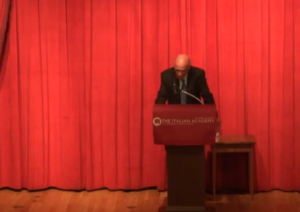
Richard Falk: The Palestinian Future After Gaza
We hear a presentation by Richard Falk titled The Palestinian Future After Gaza. Richard Falk was presenting at the Edward W. Said Memorial Lecture, co-sponsored by Columbia’s Heyman Center for the Humanities. It’s given once a year in honor of the public intellectual and literary critic, Edward W. Said, who taught in the English & Comparative Literature Department at Columbia from 1963 until 2003
Richard Falk is Albert G. Professor of International Law and Practice Emeritus at Princeton where he was a member of the faculty for 40 years. Since 2002 he has been associated with Global & International Studies at University of California, Santa Barbara as a research professor.
He was Special Rapporteur on Occupied Palestine for the UN Human Rights Council since 2008, and served on a panel of experts appointed by the President of the UN General Assembly, 2008-2009. He is Chair of the Board of Directors, Nuclear Age Peace Foundation, an NGO located in Santa Barbara.
He is also a member of the editorial board of several journals and magazines, including the American Journal of International Law, Third World Quarterly, Globalizations, The Nation, and The Progressive. Formerly, he was for many years North American Director of the World Order Models Project.
————————————————————————–
Afghanistan War, Civil Liberties, Climate Change, Criminalizing Dissent, FBI Intrusion, Gaza, Human Rights, Iraq Veterans, Iraq War, Targeting Muslims, Torture, War Resister
Podcast: Play in new window | Download
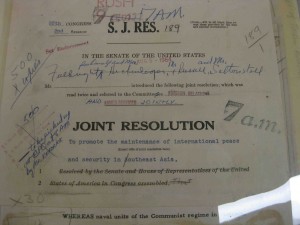
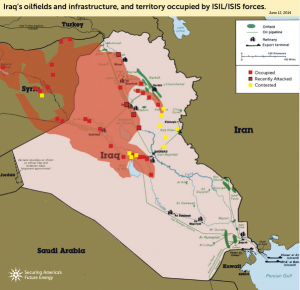
The Legality of War Powers: Michael Ratner
Law and Disorder co-host Michael Ratner explains war powers in the United States and questions the legality of President Barack Obama decision to launch attacks against the Islamic State using the 2001 Authorization To Use Military Force. Michael Ratner and Jules Lobel with the Center for Constitutional Rights have brought a number of cases challenging the decision to go to war including Vietnam, El Salvador and Grenada
Attorney Michael Ratner:
- I’ve spent as a number of us had a lot of our lives trying to restrain U.S. war powers. The U.S. particularly the president or the Congress together going to war around the world.
- It’s been a task that has been singularly unsuccessful, starting with Vietnam where we brought case after case. Only at the very end of the war really did Congress finally act to restrict the president after there were secret wars carried out in Cambodia, in Laos, not just Vietnam.
- Right now the president hasn’t asked for any authority from Congress to either bomb targets in Iraq that he claims are Islamic state targets or presumable if they begun it bombing in Syria, again targets he claims that are Islamic state targets. He’s not asked for any authority.
- He has of course had to use some funding that Congress I think will approve if he asks for more. That is not considered giving authority by Congress, just because they fund a war.
- Coming out of Vietnam, Congress did sort of a mea culpa. They said well, the president dragged us into this war, we passed this Gulf of Tonkin Resolution which was this open ended resolution that said the president could do what ever he wanted in Vietnam. He kept fighting the war based on this broad authorization that Congress gave him over a false incident. . .
- The Gulf of Tonkin Resolution you could liken to the authority Congress gave the president to go to war in Afghanistan called the Authorization to Use Military Force.
- (Still back to Vietnam) So Congress passes what’s called The War Powers Resolution. Congress said to itself, we don’t want to be in the situation like Vietnam again.
- The president, yes is required to go to Congress before he can go to war with any country. The framers were very clear, we don’t want a president making war on his own.
- You get to Vietnam and Congress says we’re going to make a special statute. You still need a declaration of war or a special passage by Congress of a statute authorizing war before you can make war. But in just in case the president goes in to a country without getting a declaration from us or a statute allowing it we’re going to say he can only stay in that country for 60 days.
- After 60 days he’s required to pull out all troops from that country.
- There’s never been any compliance with the War Powers Resolution in the history of our country – where after the 60 day clock, the president has pulled out the troops.
- I’ve litigated that with El Salvador when the U.S. sent in “advisors” into El Salvador, we’ve litigated it in Grenada and other places.
- We litigate these on 3 bases. Non compliance of the War Powers Resolution, Secondly non-compliance with the U.S. Constitution which is the Congress has to declare war not the president, and third non-compliance with the U.N. Charter which says there can be no use of force by any member state, unless its self defense or the UN Security Council approves it.
- The problem here isn’t really a problem of law. The problem here is the problem of having a hegemonic imperialist country that dominates the world through force.
- So that turns us back to where we are right now.
- Obama has two justifications – one is the original grant of authority to bomb and go and use force and U.S. troops in Afghanistan called the Authorization to Use Military Force passed shortly after 911 in 2001 which basically said the president could use force to go after the perpetrators of 911, those who harbored them or those who aided and abetted them.
- In the case of the Islamic State they’re at war with has been denounced by al-Qaeda, so they’re certainly not part of a 911 conspiracy at all.
- There’s no question that he’s illegally bombing the Islamic State in Iraq, illegally bombing them to the extent he is in Syria.
Law and Disorder Co-host Attorney Michael Ratner, President Emeritus of the Center for Constitutional Rights (CCR), a non-profit human rights litigation organization based in New York City and president of the European Center for Constitutional and Human Rights (ECCHR) based in Berlin. Ratner and CCR are currently the attorneys in the United States for publishers Julian Assange and Wikileaks. He was co-counsel in representing the Guantanamo Bay detainees in the United States Supreme Court, where, in June 2004, the court decided his clients have the right to test the legality of their detentions in court. Ratner is also a past president of the National Lawyers Guild and the author of numerous books and articles, including the books Who Killed Che? How the CIA Got Away With Murder, The Trial of Donald Rumsfeld: A Prosecution by Book, Against War with Iraq and Guantanamo: What the World Should Know, as well as a textbook on international human rights.
———
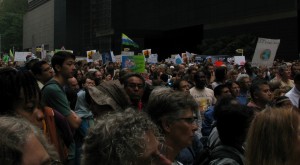
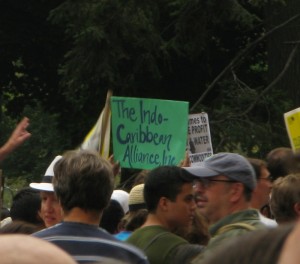
The People’s Climate March and the United Nations Climate Summit
We hear the voices from the climate march held in New York City, a large-scale activist event to advocate global action against climate change. The march winded through the streets of New York Sunday, September 21, 2014. Initially called by 350.org, the environmental organization founded by writer/activist Bill McKibben, the march has been endorsed by nearly 400 organizations, including many international and national unions, churches, schools and community and environmental justice organizations. The action is intended to coincide with the UN Climate Summit this week as U.N. Secretary General Ban Ki-moon invited leaders of government, the private sector and civil society to arrive at a long term solution for climate change.
——–
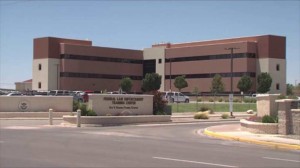
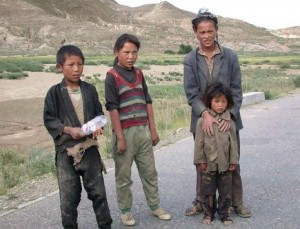
National Immigration Project
Last month the National Immigration Project of the National Lawyers Guild and several other groups sued the federal government to challenge its new and unlawful “fast-track” expedited removal policies that are being used against mothers and children detained in Artesia, New Mexico. Artesia is a remote detention center hundreds of miles from the nearest city. Lawyers with the NIP have collected evidence showing the government disregarding and pushing mothers and children through a deportation process making it nearly impossible for them to consult attorneys, prepare claims for asylum or any defenses to deportation. A class action lawsuit was brought by the Northwest Immigration Rights Project challenging the treatment of unaccompanied children in California with the average of 10 years old.
Paromita Shah:
- Starting in early April the government began to see a surge in arrivals of families – of mothers and children and sometimes children who came by themselves.
- Predominantly these children and families come from countries Honduras, Guatemala and El Salvador.
- They fled their home countries for a variety of reasons, mostly to escape what was horrific atrocities they experienced.
- They went to other countries as well, since other countries have seen a 700 percent increase in asylum claims. Costa Rica and Bolivia.
- The surge is not new. The surge actually began about 5 years ago when people were reporting an exponential increase of children coming across the border and no one knew what to do about it.
- From the stories we’ve heard from many of our members they are fleeing horrific atrocities and came to the United States to seek refuge here.
- The National Immigration Project of the National Lawyers Guild and the ACLU and a number of organizations sued the federal government to challenge its policies that denied a fair deportation process to the families and the children who fled this extreme violence.
- The primary focus of our argument is that these people weren’t given a chance to apply for asylum.
- We are violating our laws that relate to asylum, that relate to the convention against torture. These are laws not only in the United States but also international treaties that we’ve signed onto.
- If you fled a country that abused you and injured you, you would come to the United States border. At that point our laws set up a process called expedited removal. It’s a two stage process.
- The first step includes an interview with asylum officer to evaluate if you have a credible fear. When I say border that’s at any point of entry in the United States.
- Anywhere within 100 miles of the border (U.S.) because that’s how we define the border.
- Two thirds of the population of the United States lives within 100 miles of the border.
- Artesia New Mexico is a federal holding cell for the 672 people who are now detained there.
- If you’re a child that doesn’t have an adult with them you’re supposed to be treated differently under this process. They are not as a practice supposed to be put into expedited removal because of their age. You will have a chance to apply for asylum ( which is incredibly difficult) because you apply without an attorney.
- There are children in New Jersey, Washington state, Texas, L.A., and Florida.
- Children can’t always talk if they were raped or recruited into a gang or brutalized by a gang.
- J.E.F.M. v. Holder
- The irony of this whole process is that Artesia is in New Mexico. The immigration court that’s holding these hearings around Artesia is in Arlington, Virginia.
- They’re conducting these hearings by video.
Guest – Paromita Shah, associate Director of the National Immigration Project. She specializes in immigration detention and enforcement. She is the contributing author and co-presenter of the Deportation 101 curriculum.
———————————————————-























